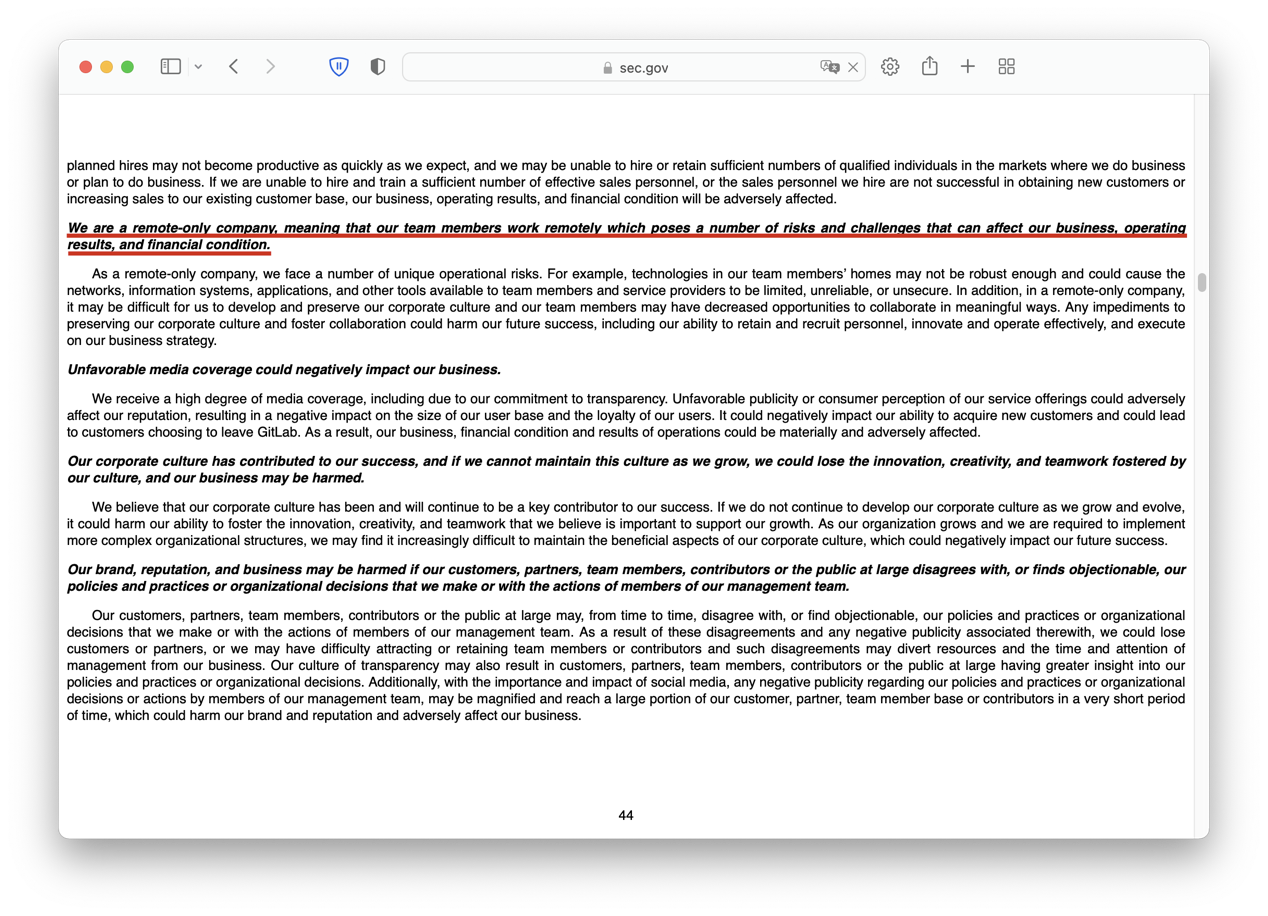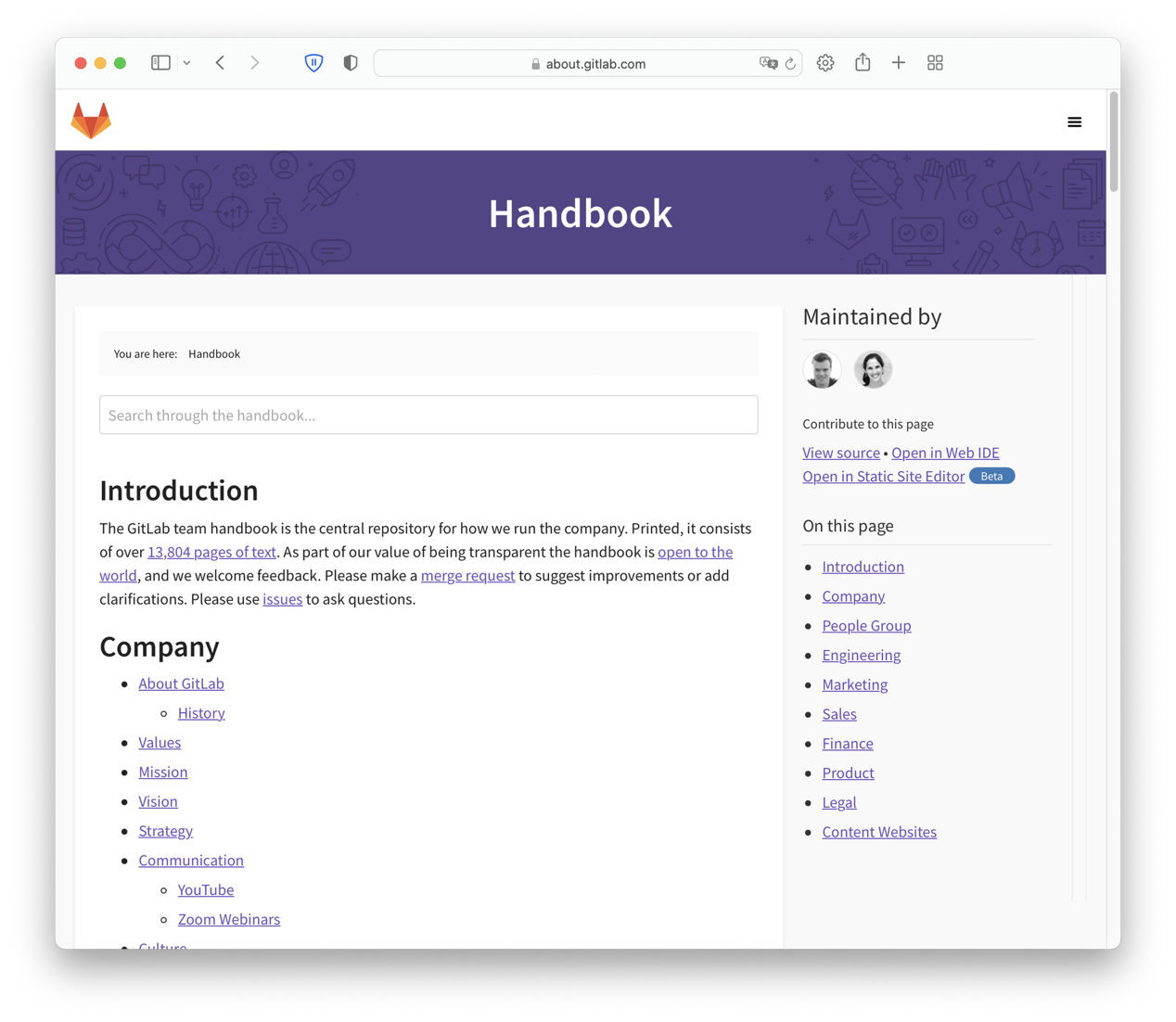About the author: Liang Qihong, co-founder of FinoGeeks, former IT managing director and chief architect of GF Securities, former chief architect of Yahoo Beijing Research Institute.
As the concept of the "metaverse" becomes more and more popular, is there any chance we can use it to achieve the ultimate goal of working from home?

image description

Now whenever I think of Facebook changing its name to Meta, I think of this picture of Mark
image description

secondary title
This all-home-work unicorn goes public
No matter when the "Metaverse Go to Work" comes, there is a company without an offline office that has passed the listing to prove that an office is not needed.
image description

GitLab's logo looks like a fox
The company has 1,350 employees, distributed in 65 countries around the world, adhering to the principle of "Remote-only". Since its establishment in 2014, it has no offline office, and the design, production and marketing of technical products are carried out by remote collaboration of all employees. And sales, and use these tools to help other companies (often end up as customers) harness their remote teams and start full-line production collaboration. It is worthy of being a "geek" technology company that "eats its own dog food", and must practice the most thorough, purest, and large-scale remote office collaboration with its own tools in order to use the most convincing experience and understanding. Knowledge is reflected in its own products, launched to the market and achieved success.
One of the risks disclosed by GitLab in its listing filing is that the technical environment for company members to work from home may not be good enough, which may lead to the lack of robustness and security of the network, system, and application tools provided to them.
This disclosure is of course a sound move – because it seems that no company with a similar model has gone public before. But this long-distance ability is actually regarded as a kind of competitiveness by the market:
First of all, the development of this company since the epidemic can only be said to be unscathed, and it is likely to be promoted, and the "vulnerability" of relying on the office to survive has been eliminated;
Second, if we believe that the world can only become more and more digital, then we can also bet that any barriers created by physical distance between people are constantly being replaced by more real-time networks, higher-quality video, better Advanced interactive devices such as AR/VR are solved, and companies that are the first to abandon offline entities may win the competition;
image description

In the IPO application risk disclosure, GitLab specifically listed the remote office part as a possible risk
Some people say that it is not safe for employees to visit company facilities from home. This is obviously looking at new things with a lack of development. As long as demand starts to emerge, there will naturally be companies to consider and solve security management problems, and companies that specialize in solving such problems will be born, further promoting remote office to become the mainstream In progress?).
secondary title
This... is indeed a big problem
secondary title
It is difficult for remote collaboration organizations to play the "enterprise family" card
MarketWatch (Dow Jones's market information media) commented on GitLab's IPO report that GitLab very directly discarded the "cliché" of the corporate family that many technology companies like to promote. The CEO of GitLab directly pointed out to investors that he does not recognize the idea that the company is a "family" of employees. The warm relationship is not the ultimate goal of the company, but the result.All members need to be responsible for their own work and meet the company's clearly stated requirements and standards. If the individual's performance is below expectations, the company tries to coach him to help him improve, and if he continues to fall short of expectations, he can only be let go.
image description

Telecommuting is no longer restricted by geographic location
The culture of "big family" and "blessings" that not only plays the card of warmth but also requires 996 may be suitable for some enterprises, and may not be suitable for others. What kind of values does a digital enterprise that pursues a fully remote working method have? Here are some for discussion:
(have to) respect the individual
Because the members are all staying at home or in a coffee shop, not in the "factory", you can't use the clock-in management of the industrial age and the "supervisor" of a large number of middle-level cadres to control. You can't make a phone call every hour, hold a video conference to check what everyone is doing, right?
(have to) build trust
Under the management system of the industrial revolution era, the vicious capitalists first assumed that workers were lazy and lazy, and established various supervision systems under the assumption that "human nature is inherently lazy". In fact, it is not so easy for you to judge whether a "knowledge worker" produced by the brain is producing or not, and the quality of the output is. You can only be Trust but verify (trust first and then verify). That's right, it's the same as the "object downward transformation" when we program, that is, the compiler first lets your downward transformation code pass, assuming your transformation type is OK, but it still helps you verify when running the program , to prevent "undefined behavior" - undefined behavior
result-oriented
GitLab's point of view is "Measure results not hours". GitLab claims that employees don't have to feel as if they've done something wrong for taking an afternoon off, but on the other hand, they don't have to use their overtime hours to "incite" competition (does it cause "involvement"?). The company trusts that everyone is subjectively willing to do the right thing, as long as you do your duty and complete the task, the results will prove everything. What if you really work overtime every day without end? GitLab says then you should indeed report to your supervisor that your overwork is a problem that needs to be sorted out
promote collaboration
It is obvious that team spirit is very important both online and offline. But online is more important, more critical, and more difficult. If the team cannot collaborate remotely through digital tools, can it be said that the company's digital efforts have basically failed?
be transparent
Every member of the company works in an independent environment, and the transparency of information can be said to be crucial to the entire virtual community, otherwise it will be an information island. No one wants to work with black-box peers – not knowing progress, when tasks will be completed, whether things are coming out as expected, or even if their work is in progress... without being able to meet in person, This uneasiness intensifies. The decision-making information of the team organization is opaque, which will also lead to speculation, rumors and disputes offline, which will only intensify online. High transparency is a prerequisite for teamwork, and vice versa is a source of anxiety
Tolerance, do not blame unintentional mistakes
This is actually one of the results of "transparency". When errors, faults, or problems occur, first understand the root cause of the problem, and then find a solution, and then discuss and share together to avoid the next occurrence. Forming a culture of rationality and dealing with things rather than people makes it easy to discover the truth and prevent everyone from focusing on how to prevaricate because they are afraid of being held accountable. For remote collaboration teams, there are more possibilities for misunderstanding than offline collaboration, but you don't even have the opportunity to explain face to face or have a cup of coffee to talk. It is difficult to establish rational communication without a cultural atmosphere that treats things wrongly, seeks the truth first, and makes mistakes in reviewing
Some managers find it difficult to feel at ease about the people and things they cannot see in front of them. It is understandable that they may only feel at ease when they see a floor full of code farmers in full swing, fighting like a farmer's market. Because some values are determined by genes. Value orientation is reflected in team culture, and culture determines team behavior. Whether remote collaboration can release productivity depends first on culture.
secondary title
Remote organization = virtual community + game guild?
The inevitable result of digitalization is the three inevitable answers of "individualization", "communityization" and "ecologicalization".
Individualized, independent (gu) independent (du) work without space constraints;
Communityization, individuals are called by common goals, values, and subcultures to form virtual social groups;
Ecologicalization, the boundary between inside and outside the enterprise becomes blurred, and external users interact with internal employee groups through various social tools to form an extended community;
Users may become fans of the company because they like your technology and identify with your culture, or even become employees.
A new generation of companies based on open source technology is good at combining technology, products, the company's own operating methods, and cultural values. Technology precedes productization, and product commercialization creates a company. The company is an online virtual community, and the community is condensed by culture. , Cultural dissemination is marketing.Many members of the community may have never met and are only "friends". In order to coordinate their common effective output across regions and even across time zones, it is first necessary to establish a value orientation that conforms to the characteristics of the digital age, secondly, to strengthen the cultural communication that reflects these values in the community, and then to gradually explore one version after another of remote Collaborative best practices (yes, like releasing software), continuous upgrades.
When a new employee joins a company, she can often feel the company culture implicitly through the decoration style, slogans on the wall, colleagues' way of doing things, etc. in the office. But if she joins an online business without an office, how can she feel the culture of this organization?
image description

A "giant" employee handbook maintained by Gitlab
GitLab employees jointly maintain a huge employee handbook of more than 10,000 pages, and adhere to the "handbook first" guidelines, from corporate culture, values, engineering management, product design, marketing operations to remote work guidelines, human resource management Systems, incentive systems, etc. are all available, not only for employees to see but also for anyone on the Internet to watch.
The Handbook also acts as a "Single Source of Truth" (SSOT - Single Source of Truth) inside and outside the company, as if to say: Look! This set of products is produced by a team that believes in such values and operates in such a way.
secondary title
Is it like a game guild?
image description

Large game guilds often have guild conventions and codes of conduct
Although it is "community self-government", there are different types of management, including "centralized system" managed by a few people, "parliamentary system", and a combination of the two. There are standardized procedures for joining members, and there are entry thresholds and fixed procedures for recruiting members of the guild. As long as it is registered as a company, it will become a digital business organization if you are not careful.
What fascinates some people about playing games is that the rules of a good game are open, fair and just, "no unwritten rules". The game rules, community conventions, and guild regulations in the game world are often more transparent and direct than the corporate rules in the physical world. There is no tacit understanding, no self-evident, no overtones, and even if there are, they will be revised to be straightforward by the community As far as being explicit, everyone believes in it.
secondary title
Remote collaboration starts with these three things
1. Implement the asynchronous principle
I believe that no one is willing to hold a meeting for three or four hours in a conference room, because everyone has to put down their work, sit together in a space, and have to listen to some discussions that are obviously irrelevant to them. The way of communication is called "synchronization", which is technically called "blocking" communication, and coders who write network code know it. If this method is moved to the video conference room in the same way, the degree of deterioration of the effect will increase exponentially with the length of time!
Remote collaboration cannot avoid meetings, but in principle: (1) If there is no meeting, do not hold a meeting. Try to write down the things that need to be synchronized, shared, and discussed with collaborative tools, and let relevant people circulate and comment on feedback. The advantage of this is that when you write something, you will be more logical and thoughtful, and the accumulation of information records will form the background context of a matter, which is more transparent, and people who intervene at any time can trace the source and process, while offline or video conferences However, it is often impossible to even write the minutes of the meeting. People who have not participated in the meeting before joining a job need to learn about information points and form cognitions; (2) Even if the meeting is held, try to compress the time as much as possible. Learn to respect other people's time.
Asynchronous collaboration has three cultural challenges. The first is whether the company can gradually accept employees as parallel contributors to some projects, just like an open source community, where community members contribute code maintenance, functional testing, and product design to a project in different time zones and different locations; As for whether you can let go of anxiety, I believe that although the team does not work synchronously within a certain period of time, the asynchronous relay model can still reach the target milestone; the third is whether the company is prepared for transparency and information is recorded. The more detailed it is, the easier it is for decisions to be traceable.
2. Document everything
It can be said that, ideally, the knowledge accumulation of the entire company (or community) should be digitized to the greatest extent – meeting minutes, product planning documents, project iteration plans, marketing plans, technical architecture design copywriting, etc., in text , voice, video, and application tool data are stored in a unified manner and become the company's digital assets. When working offline, people often rely on verbal communication due to the convenience of face-to-face, and subsequent records often become an additional burden and are omitted. In online office, text has become the main carrier of communication. It is no longer an additional record after communication, but communication itself.
Instant messaging tools are actually not the best asynchronous collaboration tools, because chat records about a certain matter are easily overwhelmed by follow-up information, and it is not very convenient to retrieve them again, and the promotion of transparency is not enough. After all, some work discussions are suitable for automatic Documented (such as when people write their opinions in a more structured way), but confined to a chat room, and everyone expressing it has to be found and reposted. Therefore, the use of tools such as wikis, community forums, and shared documents is more conducive to the transparency of information, and collaborators can also understand the context of transactions at a lower cost.
3. Automate everything
Automated analysis, automated construction, automated packaging, automated testing, and automated deployment to the preview environment after submitting the code; after employee A completes a task, the chat robot automatically notifies employee B; automatic push reminders before the task deadline; visitors visit the official website or the public The content of the account can instantly generate a work order and send it to the operation personnel; various data panels will automatically display the progress, status, and indicators, saving countless manual weekly reports and the trouble of chasing business data team by team and department by department.
Automation is an artifact to treat procrastination. There is no need to urge or wait. The distributed team is operating and cooperating in an orderly manner with the assistance, reminders, and scheduling of automation tools.
secondary title
People sit at home and money comes from online?
Not afraid of the city closure, not afraid of the epidemic infection, not afraid of commuting hazards caused by extreme disasters brought about by climate warming (uh... it should be said that the power will be cut off and the Internet cafes will be cut off, but who is not afraid?), the company maintains a healthy operation; for individual employees , People sit at home, money comes from online, code writers write codes, test tests, community operations operate on various social platforms, marketing promotions are promoted on various online media... in an orderly manner, each performs his duties, and returns to the family.
According to Zuckerberg, it also helps society reduce its carbon footprint and reduce carbon emissions. Too utopian? More and more business organizations are trying this path.
What individual members need to think about is how to show their professional qualities in the virtual community? How to generate personal influence and become a voice leader? How to maintain efficient output in the free environment at home? How to ensure the quality of output and avoid risks to the team and organization? How does it fit in a community to collaborate asynchronously with others in a highly transparent manner? Solve these problems, and everyone will be able to "play" happily together in the corporate community.
(Information disclosure: The author of this article does not hold GitLab stock, occasionally uses GitLab products, but often watches the GitLab website)